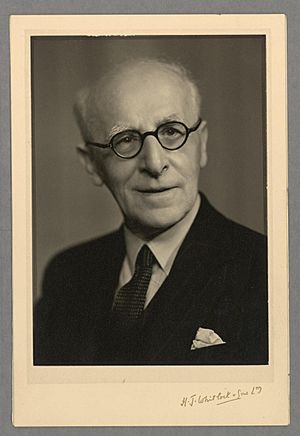Gwilym Davies (minister) facts for kids
Gwilym Davies (born March 24, 1879 – died January 26, 1955) was a Welsh minister who worked hard to bring countries closer together. He supported important groups like the League of Nations and later the United Nations. He also started the yearly World Wireless Message to Children in 1922. Plus, he was the first person to speak on the radio in Welsh, on St David's Day in 1923.
Contents
Early Life and Ministry
Gwilym Davies was born on March 24, 1879, in Bedlinog, a village in south Wales. His father, D. J. Davies, was also a Baptist minister. Gwilym went to grammar school in Llandeilo.
After school, he studied to become a minister at Midland Baptist College in Nottingham. He then earned a scholarship to Jesus College, Oxford. In 1906, he officially became a minister. He served in different places in Wales, including Broadhaven, Carmarthen, Abergavenny, and Llandrindod Wells.
Working for Social Change
In 1911, Gwilym Davies helped create the Welsh School of Social Service. He worked with David Davies, who later became Lord Davies. Gwilym served as secretary, chairman, and even president of this school.
A Champion for World Peace
In 1922, Gwilym Davies stopped working as a full-time minister. He then spent the rest of his life promoting peace around the world. He traveled a lot, especially to Geneva in Switzerland and Cardiff in Wales.
The World Wireless Message
One of Gwilym Davies's most famous ideas was the Annual World Wireless Message to Children. He started this in 1922. It was a special message of peace sent from the young people of Wales to children all over the world.
First Welsh Radio Broadcast
On St David's Day (March 1) in 1923, Gwilym Davies made history. He became the very first person to broadcast on the radio in the Welsh language.
Supporting International Organizations
Gwilym Davies was a key figure in the Welsh branch of the League of Nations Union. He co-founded it with Lord Davies and was its honorary director for many years. The League of Nations was an organization created after World War I to promote peace.
He also organized yearly meetings about international education at Gregynog from 1922 to 1939.
Helping to Create UNESCO
During World War II, Gwilym Davies led the Welsh Education Committee. This committee worked on a plan for an international education organization. Their ideas were very important in creating Unesco. Unesco is a part of the United Nations that focuses on education, science, and culture.
After World War II, Gwilym Davies continued to support the United Nations and Unesco. He became the first president of the Welsh National Council of the United Nations Association. He also helped set up the Welsh Unesco Committee.
His Writings
Gwilym Davies wrote many articles for newspapers and journals. Some of his writings were put together in a book called Y Byd Ddoe a Heddiw (which means "The World Yesterday and Today") in 1938. He also wrote other books, including International Education in the Schools of Wales and Monmouthshire (1926) and The Ordeal of Geneva (1933).
Awards and Later Life
In 1948, Gwilym Davies was given a special award called a Commander of the Order of the British Empire (CBE). In 1954, the University of Wales gave him an honorary doctorate degree.
Gwilym Davies passed away in a hospital in Aberystwyth on January 26, 1955, at the age of 75. His ashes were scattered at Lavernock Point, a place where Marconi sent the first radio messages across water.
 | Ernest Everett Just |
 | Mary Jackson |
 | Emmett Chappelle |
 | Marie Maynard Daly |


